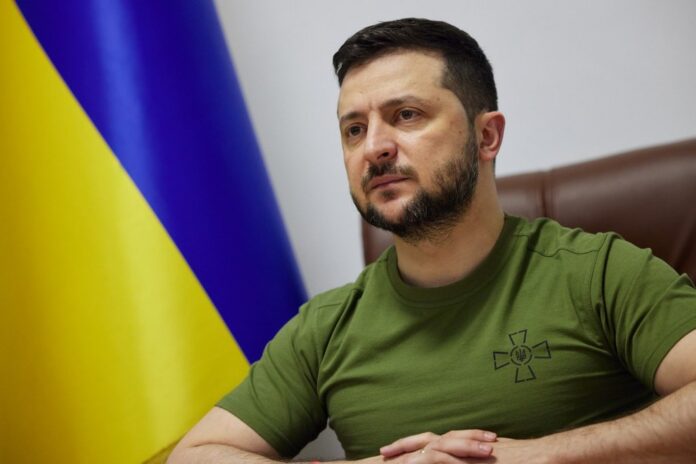President Volodymyr Zelenskyy unveils a comprehensive strategy to end Ukraine’s 28-month war with Russia through international diplomacy
In the midst of persistent conflict and escalating casualties, Ukrainian President Volodymyr Zelenskyy has unveiled a bold diplomatic initiative aimed at resolving the prolonged war with Russia. Speaking at a press conference in Kyiv alongside Slovenian President Natasa Pirc Musar, Zelenskyy emphasized the urgent need for a plan that garners global support.
“We are drafting a comprehensive plan to end the war, one that we believe will rally the majority of the world behind us,” Zelenskyy declared. His remarks underscored Ukraine’s diplomatic pivot as military operations continue with no current negotiations between Ukraine and Russia.
Embed from Getty ImagesThe backdrop to this initiative is a stark geopolitical stalemate: Ukraine insists on the complete withdrawal of Russian troops from its internationally recognized territories, including Crimea, annexed by Moscow in 2014. Conversely, Russian President Vladimir Putin demands significant territorial concessions from Ukraine, highlighting the deep-seated divisions that have prolonged the conflict.
Earlier this month, Zelenskyy hosted a high-profile international summit in Switzerland, excluding Russia, to galvanize support for Ukraine’s stance on territorial integrity. Over 90 countries participated, endorsing a final communique emphasizing the need to respect Ukraine’s sovereignty—a move crucial for Ukraine’s diplomatic strategy amidst Russian advances on the ground.
Despite these diplomatic efforts, the path to peace remains fraught. Zelenskyy’s assertion of imminent peace plans comes amid rising casualties among soldiers and civilians alike, underscoring the humanitarian toll of the conflict. With Ukraine’s high-stakes bid for international backing, the president faces a delicate balancing act of mobilizing support while navigating divergent geopolitical interests.
Analysis:
Political Perspective: Politically, Zelenskyy’s diplomatic manoeuvring represents Ukraine’s resolute stance on sovereignty and territorial integrity in the face of Russian aggression. The exclusion of Russia from international summits underscores Western solidarity with Ukraine, yet also highlights challenges in achieving consensus among key global players. The diplomatic impasse reflects broader geopolitical tensions and alliances, shaping Ukraine’s strategic calculus as it seeks to safeguard national interests amidst external pressures.
Social Perspective: Socially, the conflict resonates deeply within Ukrainian society, galvanizing national unity against foreign intrusion. Zelenskyy’s leadership in pursuing a diplomatic resolution mirrors public demands for stability and peace, amid widespread civilian displacement and economic hardship. The humanitarian impact underscores the urgency of ending hostilities, as civilian casualties mount and societal resilience is tested amidst protracted conflict.
Human Rights and Economic Concerns: The conflict’s human rights implications are profound, with allegations of rights abuses and humanitarian crises exacerbating international scrutiny. Zelenskyy’s diplomatic initiatives are bolstered by appeals for human rights protections and accountability, crucial amidst reports of civilian casualties and displacement. Economically, the war disrupts regional stability, hindering Ukraine’s recovery and development efforts. International support for economic reconstruction is pivotal, amidst efforts to mitigate the conflict’s economic fallout and foster sustainable growth.
